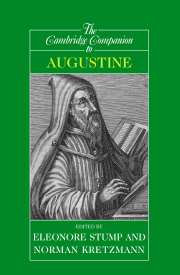Book contents
- Frontmatter
- Introduction
- 1 Augustine
- 2 Faith and reason
- 3 Augustine on evil and original sin
- 4 Predestination, Pelagianism, and foreknowledge
- 5 Biblical interpretation
- 6 The divine nature
- 7 De Trinitate
- 8 Time and creation in Augustine
- 9 Augustine’s theory of soul
- 10 Augustine on free will
- 11 Augustine’s philosophy of memory
- 12 The response to skepticism and the mechanisms of cognition
- 13 Knowledge and illumination
- 14 Augustine’s philosophy of language
- 15 Augustine’s ethics
- 16 Augustine’s political philosophy
- 17 Augustine and medieval philosophy
- 18 Post-medieval Augustinianism
- Bibliography
- Index
3 - Augustine on evil and original sin
Published online by Cambridge University Press: 28 May 2006
- Frontmatter
- Introduction
- 1 Augustine
- 2 Faith and reason
- 3 Augustine on evil and original sin
- 4 Predestination, Pelagianism, and foreknowledge
- 5 Biblical interpretation
- 6 The divine nature
- 7 De Trinitate
- 8 Time and creation in Augustine
- 9 Augustine’s theory of soul
- 10 Augustine on free will
- 11 Augustine’s philosophy of memory
- 12 The response to skepticism and the mechanisms of cognition
- 13 Knowledge and illumination
- 14 Augustine’s philosophy of language
- 15 Augustine’s ethics
- 16 Augustine’s political philosophy
- 17 Augustine and medieval philosophy
- 18 Post-medieval Augustinianism
- Bibliography
- Index
Summary
Before his conversion to Christianity, Augustine conceived of God as a supremely good being who is “incorruptible, inviolable, and immutable ” (Conf. 7.1.1). At the same time, he was aware of the existence of evil in the world, evil that can be divided into two major classes. First, physical objects have limitations and defects. In particular, the limitations of living things result in hardship, pain, illness, and death. Secondly, there are people who behave wickedly and whose souls are characterized by such vices as pride, envy, greed, and lust.
- Type
- Chapter
- Information
- The Cambridge Companion to Augustine , pp. 40 - 48Publisher: Cambridge University PressPrint publication year: 2001
- 6
- Cited by

